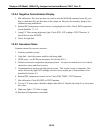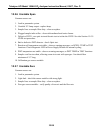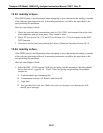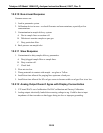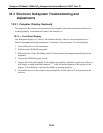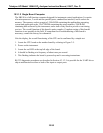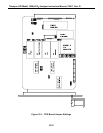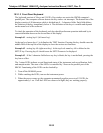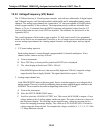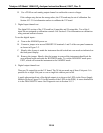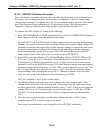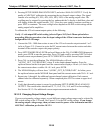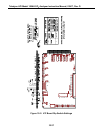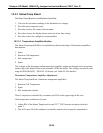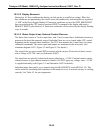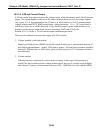
Teledyne API Model 100AH SO
2
Analyzer Instruction Manual, 02417, Rev. D
10.3.2 Voltage/Frequency (V/F) Board
The V/F Board consists of 16 analog input channels, each software addressable; 8 digital inputs,
and 24 digital outputs, each line independently addressable; and 4 independent analog output
channels. The analog input channels are connected to V/F converter capable of 80,000 counts,
which is approximately 16 bit resolution. The integration period is software selectable from
40msec to 2.4 sec. Commands from the SBC40 computer and digitized values from the V/F
section of the board are sent via the STD bus interface. The schematic for the board is in the
Appendix 00514.
The overall operation of this board is quite complex. To fully check out all of its operational
modes in the field is not recommended. Therefore, a few of simple tests are described here that
test one analog input channel, the 4 analog output channels, one digital input, and one digital
output.
1. V/F board analog input test.
Each analog channel is routed through a programmable 16 channel multiplexer. If one
channel works, chances are they all work.
A. Turn on instrument.
B. Press TEST key on front panel keyboard until DCPS test is displayed.
C. The value displayed should read 2500 ± 100 mV
If the M100AH passes this test, it has successfully digitized a 2500 mV composite voltage
output from the Power Supply Module. The signal should also be quiet ± 25 mV.
2. Analog output channel test.
In the DIAGNOSTIC menu on the front panel, there is a test that outputs a step voltage to the 4
analog outputs. This test is useful for calibrating chart recorders and dataloggers attached to the
M100AH. The test can also be useful in diagnosing faults in the V/F board.
A. Turn on the instrument.
B. Enter the SETUP-MORE-DIAG menu.
C. Scroll to select the ANALOG OUTPUT test. This causes the M100AH to output a 5 step
voltage pattern to the 4 analog outputs on the rear panel. The status of the test is shown on
the front panel display. The scrolling can be stopped at any voltage by pressing the key
below the changing percentage display. The values are 0-20-40-60-80-100% of whatever
voltage range has been selected. For example the voltages would be 0, 1, 2, 3, 4, 5 V if the
5 V range had been selected.
10-33



